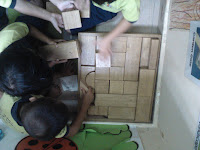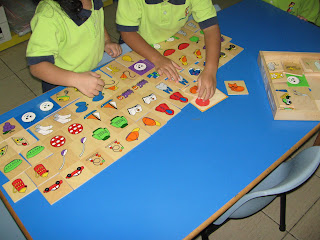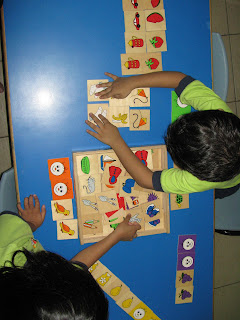My poorest subject in school was mathematics. I was repeatedly asked to do correction of the maths problems that I had done wrong. I was asked to stand by my maths teacher's side and to recite the time-table. If I got it wrong, I would be caned on my palm. I hated maths and I hated my maths teacher. Their concern was to get the right answers from the students. The problem sum was a real problem to me! Therefore, I would like to make sure that the children enjoy and understand what they are learning when they are mathematics.
Elementary and middle school mathematics - Teaching developmentally
Chapter one
As the supervisor of the childcare centre, I have to ensure the teachers have the knowlege of how children learn mathematics and the right approach of instruction. I believe the children must be able to make sense of mathematics and to know that mathematics is a way of life. The teachers on the otherhand have to challenge and support the children in their thinking and reasoning when they are doing mathematics. Learning mathematics are not only from text books in the classroom but it can also be learnt outside of the classroom and intergrated with other subjects such as science, cookery and art.
As stated in chapter one in the principles and standards for school mathematics that all children to be given the opportunities to learn mathematics, it is important that I ensure that all the children in my childcare centre have the opportunities to learn mathematics.
My childcare centre being a voluntary welfare organisation having children of diverse bacground; children from dysfunctional families, low and average income and of different races, the school is the place where the children would be able to focus on learning mathematics. It is more so for these children to learn to think and reason to solve problems. They have to understand that they have to communicate, make connections and that there are many different approaches to solve problems. These are important life skills.
To give these oppportunities to the children, the teachers have to look into the features of the six principles especially the teaching principle that requires them to know what how and what the children need to learn and what the teachers need to know to enable them to find different strategies to enhance the children learning. It is also important for teachers to assess and evaluate the children's understandings so that the children could be given the needed support and challenge to enhance their learning. Though I feel that very young children learn best through concrete materials, using technology such as calculator and computer with their great animation would increase exploration and enhance representation of ideas (pg. 3). Technology could extend the range of problems that can be accessed (pg 3) and enhance children's learning where traditional methods cannot. As I had very bad experience in learning mathematics, it is important that the children understand the concepts what they are learning and find different ways to understand. In my childcare centre, the children are given the opportunities to learn mathematics in different ways and settings. At the block and manipulative centre, children learn geometry , number and operations and measurements through play. The teachers would engage the children in learning the concepts with problems solving so that the children are able to make sense of what they are learning and thinking logically the answers that they provide.
I believe in striking a balance of the traditional circular of repetitive conditioning and conceptual understanding.
Children learn through exploration at the block centre
Logical assumption - Problem Solving
 |
| Investigating shapes |
 |
Matching - Exploring Maths Concept |
 |
| Sorting according to colours |
Chapter Two
I was afraid to make mistakes when doing mathematics problems. The teachers would focus on getting the right answers with the right procedures. I have to make correction of my wrong answers by copying from my friends who had the right answers. I did not understand why I did wrong and I did not understand either why my friends did right! Doing mathematics was so fearful and agonising.
I would like to create a culture whereby children would explore, investigate, share ideas and take risk in solving the problems. The teachers should see that the children should not be afraid to make mistakes and that the children should learn to figure out different ways of solving the problems.
The atmosphere of the class should be that of children be allowed to give ideas in solving problems in whatever methods they contributed. Their contribution should be appreciated and that mistakes made should be corrected and learned. The correction of the mistakes from the children‘s contribution give everyone the opportunities to learn in many ways to solve problems. I also increase the children’s level in analytical thinking and reasoning. As such some children would have the opportunities to build on (scaffolding) the prior knowledge that they had and some children would be a new knowledge that they acquire. This is the
Constructivist theory of Piaget’s who suggested that the children’s schemas could be changed through assimilation and accommodation. Therefore is important to give opportunities for children to construct their own knowledge based on their prior knowledge and build understanding of current ideas and knowledge. On the other hand the Sociocultural theory involves children’s learning not only learning through having communication and interaction with each other but also with diagrams and pictures. Through their engagement in discussion and reflection to find solutions to solve problems, a foundation of children’s learning has been built.
Constructivist theory of Piaget’s who suggested that the children’s schemas could be changed through assimilation and accommodation. Therefore is important to give opportunities for children to construct their own knowledge based on their prior knowledge and build understanding of current ideas and knowledge. On the other hand the Sociocultural theory involves children’s learning not only learning through having communication and interaction with each other but also with diagrams and pictures. Through their engagement in discussion and reflection to find solutions to solve problems, a foundation of children’s learning has been built.
In teaching mathematics, the teachers should look into the five strands of mathematical proficiency to guide them. It involves in strategic competence, adaptive reasoning, conceptual understanding, procedural fluency and productive disposition. The children should be able to solve problems based on logical assumption, making sense of solving the problems and justifying the correct answers. In doing mathematics the children should understand the connections of different concepts and their relationship. They should also be able to see the connection in everyday lives- real world situations.
When doing mathematics, the children develop their thinking skills (reasoning and analytical skills), social skills and emotional skills.The process of solving problems would built a resilient child who would look at problems with different perspective. I wished I would have this opportunity to make maths an easy process to learn - so that all children would not fear Maths like I did.



No comments:
Post a Comment